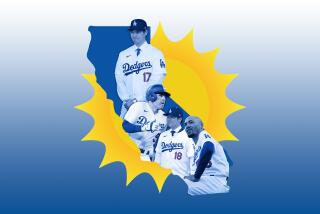Figgins Sinks Teeth Into a Pennant Race
- Share via
OAKLAND — It’s just Chone Figgins and a turkey sandwich on wheat, no plate.
The Red Sox are on television, the bus has trundled across the bridge from San Francisco, and the clubhouse is beginning to fill with the season’s familiar faces.
Garret Anderson does wander by for a moment, but he’s on his way to see the trainer for his knee. “Been better,” he says with a shrug.
Other than that, Figgins has this corner alone with his late-afternoon sustenance, with his thoughts of Barry Zito’s reborn fastball, and the opportunities Zito provides to a baserunner.
Left-hander. Average to the plate. Below-average move. The catcher, Jason Kendall, won’t help him.
That’s the book, which Figgins surely knows. But, he avoids such talk. The game is about more than scouting reports and stopwatches, as Figgins’ career would confirm. It’s about a quiet clubhouse building to game time, preparation building to a six-pitch walk in the fourth inning, a stolen base on a slide-step fastball, and 10 more pitches for Zito in the dawn of a pennant race.
Just a guy in a gray uniform, who still checks the lineup card every afternoon, picking over the day, keeping the routine fresh.
The Oakland Athletics are about to go out and celebrate the return of their physical and mental faculties after the 9-2 debacle of the night before, and win, 4-3. And the Angels are about to go out and claw at a pitcher who’s won every game he’s started since June 28. They’d throw Ervin Santana, whose uniform dangles hopelessly from his shoulders and belt loops, camouflage for a fastball that reached 96 mph in a three-pitch strikeout of Adam Melhuse in the fifth inning, even as his pitch count rose into the mid-80s, still not good enough to start the seventh for Mike Scioscia.
The Angels would drag 115 pitches out of Zito by the sixth inning, a nice feat for a lineup that hardly waits for the pitcher to let go of the ball before swinging. Bengie Molina would hit a two-strike curveball for two runs in the third inning, Melhuse would homer to start the A’s third, and the game everyone expected the night before grew from there.
“They play with what they do best,” Figgins had said of the A’s, meaning pitching and defense and just enough hitting not to sacrifice the first two.
This would be about where the Angels lost on Wednesday night, just more than two innings before they might have walked into today’s finale with a two-game lead in the American League West.
The cluster of poor plays and poor decisions that dogged the A’s through the first two innings Tuesday night found the Angels in the seventh inning on Wednesday. From nearly each of the 22 pitches Scot Shields threw, to the confusion out at the right-center field wall between Vladimir Guerrero and Steve Finley that turned Jay Payton’s easy double into an easy triple, that brought the infield in for two batters. From the missed cutoff man by left fielder Jeff DaVanon, to the ground ball that fell from Orlando Cabrera’s glove. Shields even hit the backstop with a pitch, on the fly.
But, this is what the A’s do now. Since the final days of May, they have pushed these games into the little corners where teams win. So, Guerrero had to pick up the ball clean, DaVanon could not heave the ball to third base, Shields had to come four inches farther inside to Nick Swisher, and three feet lower to Bobby Crosby.
It was exactly what Chone Figgins had been talking about; making the plays, making the pitches, running the at-bats past three or four pitches, to the point where three runs in a seventh inning where no one expected them would tie the division again.
“The Twins do it. The White Sox are doing it,” he said. “It’s something that’s coming back into play for winning teams. Some of the teams in the National League do it well. It’s not the old days anymore.”
So it was that when Figgins came to bat in the ninth inning against Huston Street, Finley having homered to bring the Angels to within a run, the public address announcer bellowed, “Third baseman Chone Figgins, playing left field.”
Figgins had moved there in the eighth, after DaVanon had been ejected for throwing his equipment not nearly as far as he’d thrown that seventh-inning baseball. Figgins changed gloves, left the dugout for left field. Then he struck out, hitless in five appearances, in six hours since that turkey sandwich.
When it was time for the bus to return over the bridge, Figgins shook his head at an earlier conversation. These things change so fast, in the flash of indecision, in the heat of August, at the birth of a six-week run.
“Especially playing these teams,” he said. “We don’t really blow people out. Neither team does. We don’t win games like that. One big hit, one big pitch, one big play. That’s it.”
More to Read
Go beyond the scoreboard
Get the latest on L.A.'s teams in the daily Sports Report newsletter.
You may occasionally receive promotional content from the Los Angeles Times.






